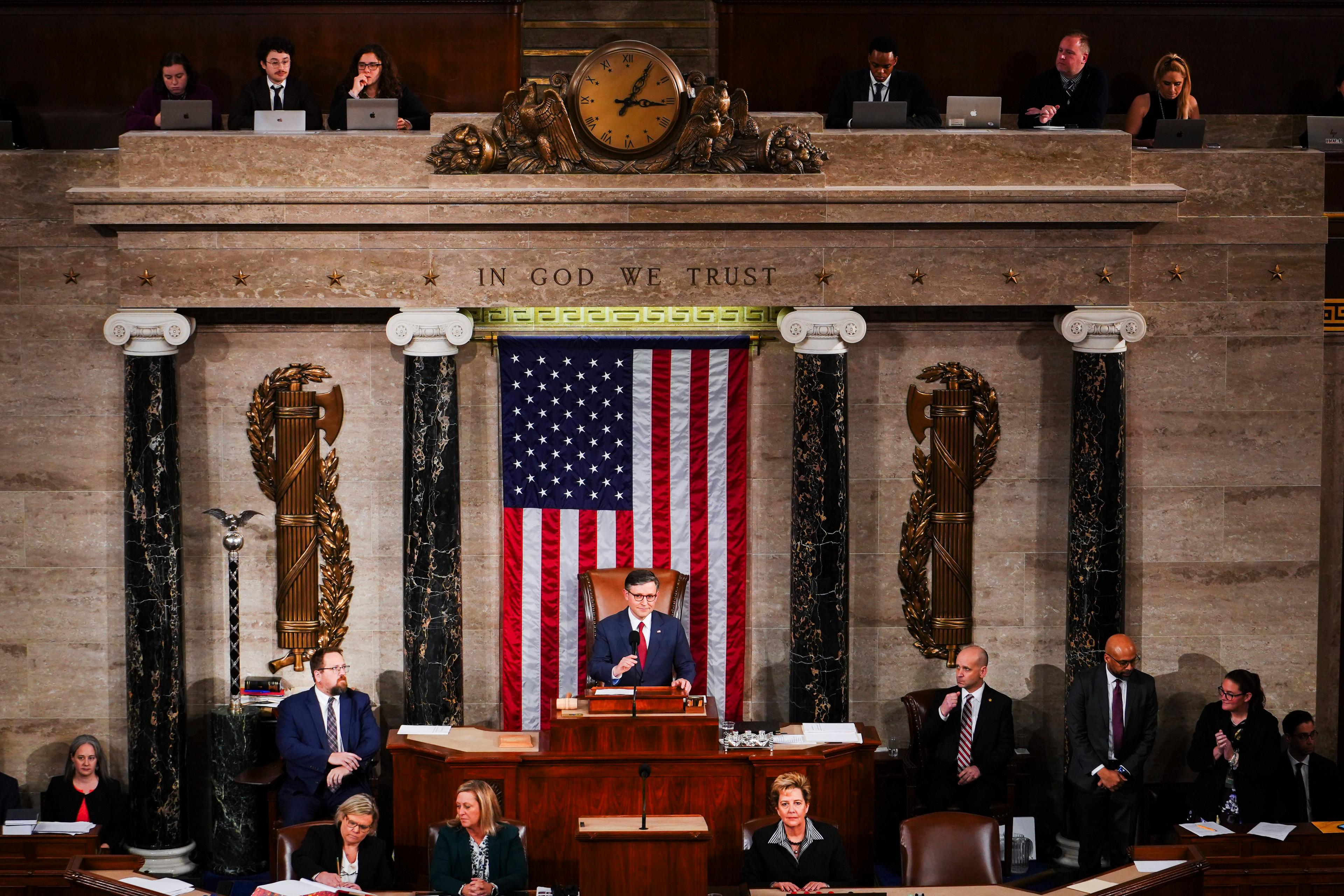After the initial tabulation of ballots, Johnson had 216 votes—two shy of the threshold needed to be elected. That was because Self, alongside Reps. Thomas Massie (R-Ky.) and Ralph Norman (R-S.C.), initially voted against Johnson.
“My sole focus was advancing the Trump agenda,” Self said in a post on social media platform X.
However, after Johnson, Norman, and Self left the chamber to have a discussion in the hallway outside, both defectors switched their ballots to Johnson, allowing him to win on the first ballot with the bare minimum number of votes needed.
Self explained his motives for the switch.
“After receiving firm assurances from the Speaker that Republicans in the House will have strong representation during the budget reconciliation process—a cornerstone of President Trump’s agenda—I changed my initial vote,” he wrote.
Here, Self is referencing the budget reconciliation process, which will likely be used for a series of GOP bills related to taxes, energy, the border, and potentially other issues.
Many Republicans felt Johnson excluded the rank-and-file members from decision-making in the previous Congress, and his critics have made clear that avoiding a repeat of that is a top priority for them.
This followed him winning on the first ballot after three members initially voted against him, with two of them switching their vote for him.
The speaker then proceeded to swear in the members of the 119th Congress.

“We have a mandate, and that was shown in the election cycle: the people want an America First agenda,” Johnson said, rejecting what he described as the former “America Last” approach to government.
“This Congress will renounce the status quo, and we will listen to the voices of the people. We will act quickly.”
The “number one priority” to that end, the speaker-elect said, is securing and enhancing the border.
“In coordination with President Trump, this Congress will give our border and immigration enforcement agents the resources that they need to do their job,” Johnson said.
“We will secure the border. We will deport dangerous, criminal illegal aliens, and finally, finish building the border wall.”
Priority number two for Republicans, Johnson said would be countering and reducing inflation.
“We’ll defeat the harmful effects of inflation and will make life affordable again for America's hard-working people,” he said.
He also mentioned a slate of other priorities: shoring up U.S. manufacturing, extending the 2017 Trump tax cuts, deregulating and increasing energy production, and “pass[ing] legislation to roll back the totalitarian fourth branch of government, known as the administrative state.”
“Congratulations to Speaker Mike Johnson for receiving an unprecedented Vote of Confidence in Congress,” Trump wrote on his Truth Social platform.
“Mike will be a Great Speaker, and our Country will be the beneficiary. The People of America have waited four years for Common Sense, Strength, and Leadership. They’ll get it now, and America will be greater than ever before!”
Trump had thrown his support behind Johnson even as several House Republicans voiced concerns about the Louisiana Republican’s leadership. That endorsement likely played a large role in bolstering his support.
While three Republican members-elect initially voted against Johnson, only Rep.-elect Thomas Massie (R-Ky.) opposed him in the end.
“It’s time for us to come together, not as Democrats or Republicans, but as Americans, to get things done for the people,” Jeffries said.
He said Democrats are ready to work with Republicans on issues such as border security but will “push back against far-right extremism whenever necessary.”
He said Democrats will work to protect Social Security and Medicare.

WASHINGTON—Rep. Mike Johnson (R-La.) on Jan. 3 was elected to reprise his role as speaker of the House on the first ballot, tamping down a Republican mutiny that could have led the vote into multiple ballots.
Johnson defeated House Minority Leader Hakeem Jeffries (D-N.Y.) for the gavel in a 218–215 vote—the bare minimum threshold to be elected. In his acceptance speech for the post, Johnson vowed that the House would pursue an aggressive America First agenda.
“This Congress will renounce the status quo, and we will listen to the voices of the people. We will act quickly,” Johnson said, citing issues like border security, inflation, and an array of others.
President-elect Donald Trump also quickly congratulated Johnson, who he earlier endorsed to lead the House.
“Congratulations to Speaker Mike Johnson for receiving an unprecedented Vote of Confidence in Congress,” Trump wrote on his Truth Social platform.
“Mike will be a Great Speaker, and our Country will be the beneficiary. The People of America have waited four years for Common Sense, Strength, and Leadership. They’ll get it now, and America will be greater than ever before!”
In the days leading up to the vote, it seemed far from guaranteed that Johnson could pull off a win in the first round.
Despite Trump’s support for the incumbent, Johnson’s decisions on spending legislation and government surveillance programs during his first term drew criticisms from many conservatives.
Several of these critics, including Reps. Thomas Massie (R-Ky.) and Chip Roy (R-Texas), had hinted—or outright stated—that they had reservations about Johnson. Massie made clear that he was intractable in his opposition to Johnson.
Normally, that wouldn’t be a problem, but with Republicans controlling just 219 seats, one above the majority threshold, Massie’s hardline opposition meant that Johnson needed the support of all but one member of his conference to win.
For many, it was reminiscent of the situation two years before, when it took five days and 15 ballots for Rep. Kevin McCarthy (R-Calif.) to win the gavel.
Seeking to head off the challenges to his bid for the gavel ahead of the vote, Johnson released a statement promising “an end to the status quo, and a return to fiscal sanity.”
“Republicans have a mandate to implement the America First Agenda, and as Speaker, this will be my priority,” he said.
GOP Mutiny Defeated
At only three defections, Johnson was immediately in a stronger position than McCarthy, who lost 19 Republicans during the first round of voting in January 2023.
Still, the vote was a nail-biter for Johnson, and he initially seemed poised to fail after Reps. Ralph Norman (R-S.C.) and Keith Self (R-Texas) joined Massie in casting ballots for other Republicans.
In the first tabulation of voting, Johnson received 216 votes, while Jeffries received 215.
Massie voted for Rep. Tom Emmer (R-Minn.), the GOP whip.
Norman, the second defector, voted for House Judiciary Committee Chairman Jim Jordan (R-Ohio), while Self followed up with a vote for Rep. Byron Donalds (R-Fla.).
Many members associated with the House Freedom Caucus also initially abstained on the first ballot, including the current chairman of the caucus, Rep. Andy Harris (R-Md.).
Other abstentions came from Rep. Andy Biggs (R-Ariz.), a former chairman of the conservative caucus and critic of Johnson, and Reps. Michael Cloud (R-Texas), Andrew Clyde (R-Ga.), Paul Gosar (R-Ariz.), and Roy.
Ultimately, each of them cast their vote at the end of the first ballot to hedge off a scenario in which Jeffries would inadvertently be elected.
With these accounted for, Johnson was still short of the 218 votes he needed. Given Massie’s hardline stance, he needed to convince both Norman and Self to change their votes.
At one point, all three were seen exiting the chamber to speak privately.
Norman later told The Epoch Times he and Self had received a call from Trump during the vote.
On that call, Trump told Norman that Johnson was the only House Republican with the “likability” to be elected speaker, Norman recalled.
Trump also promised the defectors that conservatives would be “at the table in negotiations” on legislation. Norman cited Roy as an example of one such lawmaker who could be more involved.
Conservative Demands
While Johnson was able to bring the conference’s conservatives in line behind him, they made clear that they expected Johnson to pursue a far different approach to legislating in the future.
Fortunately for Johnson, almost all members of the House Freedom Caucus immediately supported him. The caucus was seen as a potential headache for Johnson in the days leading up to the vote.
Still, several members associated with the group indicated that they had reservations about Johnson.
Rep. Lauren Boebert (R-Colo.), a member of the caucus, voted for Johnson in the first round, and made clear she expected him to earn her support.
“Don’t let us down, Mr. Speaker,” Boebert said on the House floor.
Rep. Eli Crane (R-Ariz.), another conservative member of the House Freedom Caucus, backed Johnson.
In a statement on their vote, the House Freedom Caucus said, “Today, we voted for Mike Johnson for Speaker of the House because of our steadfast support of President Trump and to ensure the timely certification of his electors. We did this despite our sincere reservations regarding the Speaker’s track record over the past 15 months.”
Both the caucus and Norman—who’s also a member of the group—said they expect rapid progress on government funding, budget reconciliation, and other priorities in 2025.
“This has got to happen in the next 12–13 months, whether it’s the DOGE commission, whether it’s folks on the budget, doesn’t matter,” Norman told reporters. “We got a short time frame to make it happen.”
In their statement, the House Freedom Caucus demanded that the House be highly active over the next year and address a slate of issues ranging from border security to congressional stock trading.
Norman indicated that he had been assuaged in his conversation with Johnson, and said that Johnson’s approach differs from that of McCarthy.
“I think [Johnson] realizes there was a growing number of us that ... just weren’t happy with the use of power [with] the speakership,” Norman said, referencing a common conservative critique of how the speaker’s authority has grown since Rep. Nancy Pelosi’s (D-Calif.) time with the gavel.
Norman said Johnson promised he would “push the conservative agenda [and] push Trump’s agenda.”
Other Republicans were relieved at the outcome.
Rep. Steve Scalise (R-La.), who has served as the House majority leader since 2023, told The Epoch Times that the day’s events went “really well” for him and his constituents.
Rep. Mike Lawler (R-N.Y.), an outspoken ally of the speaker, said in a statement, “I am thrilled that the Republican Conference has re-elected Mike Johnson as Speaker of the House.
“The American people elected us to work on the issues that matter—lowering costs, securing the border, and putting the American economy back on track—and with Speaker Johnson at the helm, I’m confident we'll get it done.”
Donalds, who was nominated for House speaker by Self on the first ballot, said he has no interest in being speaker in the future.
“No, I’m good,” Donalds told The Epoch Times. “Listen, they better be careful,” he said, referring to his congressional colleagues.

The final tally was 218 for Johnson and 215 for House Minority Leader Hakeem Jeffries (D-N.Y.).
Three Republicans initially voted against Johnson: Reps.-elect Thomas Massie (R-Ky.), Ralph Norman (R-S.C.), and Keith Self (R-Texas). But in the final moments of the vote, Norman and Self changed their vote to Johnson, handing him the speakership.
Democrats were united behind Jeffries.
This was on the first ballot—a drastic difference from January 2023, when former Rep. Kevin McCarthy (R-Calif.) won the gavel after 15 rounds of voting.

The tally, as it stands, is 216 for Johnson and 215 for House Minority Leader Hakeem Jeffries (D-N.Y.).
Three Republicans voted against Johnson: Reps.-elect Thomas Massie (R-Ky.), Ralph Norman (R-S.C.), and Keith Self (R-Texas). Other Republicans nominated for the role included Reps.-elect Tom Emmer (R-Minn.) and Jim Jordan (R-Ohio).
Democrats were united behind Jeffries.
The speaker’s battle may now go to a second round. Johnson can only afford to lose one Republican.


News Analysis
As potentially extended battles to elect new speakers of the House of Representatives become more frequent, a common fear is repeatedly expressed in the national news media that the chamber cannot act until the new speaker is chosen.
An Oct. 4, 2023, headline in the Washington Post, for example, succinctly captured the fear, proclaiming “The House Can’t Function Without a Speaker.”
More recently, a USA Today news report on Speaker Mike Johnson’s (R-La.) prospects for keeping the gavel in the 119th Congress included the declaration that “members can’t tackle any other business until someone is chosen.”
The lower chamber in the 119th Congress can function without a speaker and has done so as recently as October 2023, when former Speaker Kevin McCarthy (R-Calif.) was removed by conservative rebels led by Rep. Matt Gaetz (R-Fla.).
Rep. Patrick McHenry (R-N.C.) presided over the House as acting speaker while the House Republican Conference struggled before finally settling on Johnson to replace McCarthy.
The House convened at noon today for the first meeting of the new Legislature. The election of a speaker, the swearing-in of members, and the adoption of rules under which the chamber will operate are the first orders of business.
Fears that Johnson may be unable to keep the gavel are justified, thanks to the narrow Republican majority of 219–215. If all 435 members are present and voting, Johnson cannot afford to lose more than one vote.
Rep. Thomas Massie (R-Ky.) insists that he is a “hard no” on Johnson and half a dozen other conservatives such as Rep. Chip Roy (R-Texas) have held back on committing their votes either way.
Congress is required by the Constitution to meet in a joint session on Monday to count the Electoral College votes.
So, is it true the House can do nothing without first electing a new speaker and thus would be unable to do its duty on the Electoral College?
According to Matt Glassman—formerly a legislative procedures analyst for the Congressional Research Service (CRS) and now a professor at Georgetown University’s Government Affairs Institute—the answer is no. The House sets its own rules and can operate largely as the majority decides.
“The House can do whatever it wants,” Glassman told The Epoch Times. “Remember, at noon today, Johnson is no longer a leader in Congress, they are all just Members-elect, and the Clerk of the House is in the chair, and the highest privilege the Members-elect have is to try to elect a Speaker.”
Glassman said that “anyone who wants to demand that they keep ... trying to elect someone can, but by resolution someone can make a motion on the House floor to either elect a Speaker Pro Tem, a temporary Speaker, or they can just elect someone as an actual Speaker, but with a common agreement that he or she will step down in three days.”

Rep. Thomas Massie (R-Ky.) speaks at the U.S. Capitol on June 8, 2022. (Kevin Dietsch/Getty Images)
If the House majority was unable to exercise either of those options, Glassman said, then they could vote for a new rule making it possible to be sworn in before a new speaker has been elected. A temporary chairman could then be chosen for the specific purpose of participating in the joint session with the Senate on Monday.
In other words, the House does not shut down without a speaker.
With three Republicans voting against Johnson, he is expected to lose on the first ballot.
With Rep.-elect Thomas Massie also voting against Johnson, the speaker battle appears headed to a second round.
Massie said he would not vote for Speaker nominee Mike Johnson (R-La.).
A filibuster is an attempt to delay a vote on legislation or a confirmation by prolonging debate.
Thune said the rule today “has perhaps the greatest impact on preserving the founders’ vision of the United States Senate.”
Current rules require a 60-vote majority to invoke cloture and end debate—a high bar in a chamber that is often led by a small majority.
Republicans hold a narrow 53-seat majority in the Senate. With a few of President-elect Donald Trump’s Cabinet picks potentially facing difficult confirmation battles, Democrats may use the filibuster to stall the process.
Trump advocated for an end to the filibuster under his first administration, frustrated by the obstacle it presented to his legislative agenda.
Thune’s remarks could foreshadow future friction between him and the president-elect, of whom he made little mention. Instead, Thune stressed his duty to his colleagues and constituents and his intention to restore the Senate to “a place of discussion and deliberation ... where all members should have a chance to make their voices and the voices of their constituents heard.”
Speaker nominee Mike Johnson (R-La.) may not win on the first ballot. With full attendance, he will need 218 votes to win the gavel.
Democrats nominated their leader, Rep.-elect Hakeem Jeffries (D-N.Y.), for the speakership, though he is not expected to win.
Ahead of the vote, House GOP Conference Chairwoman Lisa McClain (R-Mich.) said on the House floor that unified Republican control of Washington is "an opportunity to put America First again.”

“Republicans have a real opportunity in the next two years to make meaningful spending reforms to eliminate trillions in waste, fraud, and abuse, and end the weaponization of government,” Johnson wrote.
“I will lead the House Republicans to reduce the size and scope of the federal government, hold the bureaucracy accountable, and move the United States to a more sustainable fiscal trajectory.”
If reelected speaker of the House, Johnson commits to three promises.
First, he will create a “working group comprised of independent experts” to work with DOGE and congressional committees to implement spending reforms that “protect the American taxpayer,” he said.
Second, Johnson promises to task that group with “reviewing existing audits of federal agencies and entities created by Congress—and issuing a report to my office for public release.”
Third, Johnson says he will request that House committees “undertake aggressive authorizations and appropriations reviews … to expose irresponsible or illegal practices and hold agencies/individuals accountable that have weaponized government against the American people.”
“Republicans have a mandate to implement the America First Agenda, and as Speaker, this will be my priority,” Johnson said.

Vice President Kamala Harris served as the presiding officer to start, swearing in new and returning members.
The list of new senators sworn in included Sens. Angela Alsobrooks (D-Md.), Jim Banks (R-Ind.), Lisa Blunt Rochester (D-Del.), John Curtis (R-Utah), Ruben Gallego (D-Ariz.), David McCormick (R-Pa.), Bernie Moreno (R-Ohio), Tim Sheehy (R-Mont.), and Elissa Slotkin (D-Mich.).
West Virginia Gov. Jim Justice was not sworn in today. He will remain governor until Jan. 13, when Gov.-elect Patrick Morrisey is sworn in.
Sens. Adam Schiff (D-Calif.) and Andy Kim (D-N.J.), also new to the chamber, took their oaths early in December.
Sen. Chuck Grassley (R-Iowa) was also sworn in as president pro tempore, after which Harris exited the chamber.
The first order of business will be to elect a speaker. Speaker nominee Mike Johnson (R-La.) is looking to keep the gavel, but it could take a few rounds. Rep.-elect Thomas Massie (R-Ky.) has repeatedly said he will not vote for Johnson.
Before the speaker vote, there will be a vote to establish a quorum.
Johnson can only afford to lose one Republican vote as all Democrats are expected to vote for Rep. Hakeem Jeffries (D-N.Y.). A speaker needs to win the majority of all votes cast; this would be 218 votes if all members are in attendance.
After electing a speaker, the House will pass a resolution establishing the rules of the 119th Congress. Members will then be sworn in.

“I have a name in mind. I have, actually, three in mind, and … I'll cycle through them as we go through these series of votes, and we'll see who gets the votes,” Massie said on “The Glenn Beck Program” ahead of Friday’s vote.
Johnson can only afford to lose one Republican vote if he is to keep his grip on the gavel. So far, Massie is the only Republican to have announced that he will not support Johnson in his reelection bid, though several others are riding the fence.
Massie acknowledged that Johnson was likely to win the speakership eventually “because that’s just the way the Swamp works.” But he estimated that there was a 30 percent chance Johnson would fail to sway a majority of the Republican conference in the first few votes, potentially prompting his support to wane and President-elect Donald Trump, who endorsed Johnson, to step in.
“I think Mike will keep trying until Trump tells him to give up. And at that point, hopefully, I joke … my colleagues are going to step on each other’s backs trying to get to the top of the heap once Mike Johnson pulls out of the race. And that’s how it would go down,” Massie said.
He did not name the candidates he was considering for fear that they would become “persona non grata” and lose any chance of gaining support. He hinted, however, that he thought the most qualified candidate would be someone who already employs a large staff.
“This was Mike Johnson’s problem when he went into the job,” Massie said. “He hadn’t been majority leader, he hadn't … been a chairman, so he didn’t have a cadre of 50 staff who were battle-tested.
“So, I think given the situation we’re in, that's the kind of person you need to get—somebody who’s ... not floppy, but they’ve got enough time and experience and staff here to get the job done.”

WASHINGTON—The 119th Congress of the United States will take office on Jan. 3, 2025, for a two-year term extending until Jan. 3, 2027. Republicans will hold a slim majority in both the Senate and the House of Representatives.
With a Republican administration leading the executive branch, it is expected that Congress will attempt to enact conservative policies into law.
These efforts will not be unfettered. Obstacles include the Senate’s cloture vote requirement—the support of 60 senators is necessary to overcome a filibuster—and divisions in the House Republican Conference amid its single-digit majority.
Key reforms are likely to be enacted using the “budget reconciliation” process, whereby bills affecting only spending, taxes, and debt can avoid the 60-vote cloture threshold in the Senate, though their effects must be limited to 10 years.
Congress will have several major legislative tasks during the first several months of 2025, which we list below.
Election of a Speaker of the House
The U.S. Constitution requires that the House of Representatives choose a speaker to preside over the body. Customarily, no legislative business is conducted in the House until the speaker is chosen. The rules of the House vest the speaker with considerable powers.
The speaker, who is usually the leader of the majority party’s conference or caucus, is the highest-ranking member of Congress and is second, behind the vice president, in the presidential line of succession.
Electing a speaker requires a majority vote of the House, which means that the majority party, if unified, can select him or her. Historically, this has been the case, whereby the winner of internal elections in the conference or caucus won unanimous support of his or her party on the floor.
However, in the 118th Congress, deep divisions in the Republican conference prevented the election of a speaker—with House Republican Leader Kevin McCarthy winning the gavel after 15 rounds of voting, making it the longest such election since 1859. McCarthy was later ousted in October 2023 because of similar divisions in the Republican conference.
Those concerns appear resurgent as regards McCarthy’s successor, House Speaker Mike Johnson of Louisiana. Despite his winning the conference leadership election and speakership nomination for the new Congress on Nov. 13, as well as his getting President-elect Donald Trump’s endorsement, some members of the Republican Conference have publicly said they may not vote for him on the floor. The conference’s two-seat majority on Jan. 3 means that the opposition of just two members could prevent Johnson’s election.
“I remain undecided, as do a number of my colleagues, because we saw so many of the failures last year that we are concerned,” Rep. Chip Roy (R-Texas) said in a statement to The Epoch Times.
The policy chairman of the House Freedom Caucus, Roy has frequently dissented from the party on fiscal policy legislation implicating the deficit, such as the passage of omnibus government funding bills every year.
On May 8, 2024, Rep. Marjorie Taylor Greene (R-Ga.) filed a “motion to vacate the chair” that would remove Johnson from the speakership—the second such resolution, after McCarthy’s removal using the same procedure. She cited his support for two government funding bills without spending cuts favored by conservatives. The resolution was “tabled” (i.e., rejected) by a wide bipartisan majority on the floor but received the support of 11 House Republicans.
Hence, barring significant concessions, it’s questionable whether Johnson can win the speakership on the first ballot, which would reignite controversy at the outset of the Congress.
Certification of the 2024 Presidential Election
On Jan. 6, 2025, Congress will convene in a joint session to certify the results of the 2024 presidential election by counting and approving the Electoral College votes of each state. The U.S. Constitution’s 12th Amendment requires this last procedural step.
As her final major act in office, Vice President Kamala Harris, who lost the election to Trump, will preside over the count.
The event will receive heightened security given the events on Jan. 6, 2021, and it has been designated as a National Special Security Event—the highest level of security. This is akin to presidential inaugurations and State of the Union addresses when all federal leaders convene at one location.
No disruptions or objections from members of Congress are expected, particularly following the passage of the Electoral Count Reform Act in 2022, which significantly raised the thresholds for objecting to election results on the floor of the joint session. Still, the event must be held, by law, on Jan. 6. Should a speaker of the House not be elected by then, the process may become complicated.
Tax Cuts and Reforms
The biggest policy item that Republicans seek to address is taxation. In 2017, the party passed the Tax Cuts and Jobs Act (TCJA) of 2017, which reduced personal income tax brackets and corporate taxes. It was Trump’s first major legislative accomplishment during his first term.
Because the bill was passed using the budget reconciliation process, many key provisions of the TCJA will expire in 2025. Republicans are seeking to renew them and prevent raising taxes to previous levels.
Additionally, some in the GOP will seek to renew a deal to expand the Child Tax Credit (CTC) negotiated in 2024 by House Ways and Means Committee Chairman Jason Smith (R-Mo.) and Senate Finance Committee Chairman Ron Wyden (D-Ore.).
The bill would expand the CTC to $2,000 by 2025, grant parents and individual credit per child, and make it fully refundable to taxpayers. The House passed the bill by a large bipartisan majority in early 2024, though the Senate, over Republican objections, did not advance it.
Republicans opposed provisions in the deal that would enable illegal immigrant parents of natural-born U.S. citizen children to claim the credit. They also have objected to a “lookback” provision that would allow unemployed parents to claim a credit based on the prior year’s income, which they said would disincentivize them from looking for employment.
Though Wyden agreed to remove that provision, GOP opposition persisted, which led some Democrats to accuse the party of thwarting the bill so President Joe Biden could not claim credit for signing it during the 2024 election.
Immigration and Border Security
The principal theme of Trump’s 2024 presidential campaign, apart from perhaps the economy, was border security. During the Biden administration, over 7 million foreign nationals illegally crossed the U.S. border with Mexico. Trump, in response, promised to launch the “largest deportation operation in American history” and reform asylum laws that enable illegal immigrants to remain in the country while their asylum claims are being processed.
Some border security initiatives, such as forcing asylum seekers to remain in Mexico while their claims are being processed, will not require legislation. However, the funding for mass deportations as well as changes to the asylum process will require Congress to pass new spending and administrative laws.
Most significantly, if Trump is going to fulfill his long-expressed desire to construct a wall along the length of the southern border, Congress will have to approve the funds.
Bills related to spending could be passed without the 60-vote cloture requirement in the Senate using a process known as budget reconciliation. However, changes to immigration and asylum laws will likely be deemed improper in such a bill by the Senate Parliamentarian, whose rulings have often constrained Democrats and Republicans in the past.
Theoretically, the Senate could vote to change its rules of procedure and either expand reconciliation or constrain cloture by a simple majority, thus overcoming this limitation. However, party leaders—particularly former Senate Republican Leader Mitch McConnell—previously have opposed doing so.
The Debt Limit
The U.S. government’s fiscal stability depends on borrowing new money to service spending as well as repay existing debts. By law, the federal government’s debt nominally cannot exceed $14.29 trillion, though repeated extensions have led the actual sovereign debt to balloon to $36 trillion at present. The last such measure, which suspended the debt limit until Jan. 1, 2025, was the Fiscal Responsibility Act (FRA) of 2023.
Despite its expiration, the U.S. government will not immediately default on its debt and spending obligations on Jan. 1. Temporary measures allowed by statute, as well as currency reserves, will enable the Treasury to meet obligations for several months. However, Congress will need to act in the first few months of 2025 to prevent a default whose effects on the global economy could be highly negative, given the U.S. dollar’s status as the world reserve currency.
Raising the debt limit has always been uncomfortable for fiscal conservatives, who seek to limit spending and indebtedness. Their opposition in 2023 led to protracted negotiations between McCarthy and Biden on the compromise FRA bill, which passed 314-117, drawing “nays” from 71 House Republicans, along with 46 Democrats.
Trump recently attempted to include another suspension of the debt limit in the recent Continuing Resolution passed by Congress to avoid a government shutdown on Dec. 20.
That effort failed after many Republicans, as well as Democrats, objected.
“He’s a fine man. He’s a very fine individual, he’s religious, he’s smart, he’s strong,” he said.
“Everybody likes him. Everybody respects him.”
Trump said he has been in touch with Rep. Chip Roy (R-Texas) and other undecided members.
“I’m just saying, look, we had the greatest presidential election. We won the popular vote by millions of votes … we had a great election, and it would be nice to cement the election with an election here. I mean, that would just be a big, beautiful exclamation point,” he said.
At the end of the day, Trump said, “Chip Roy will do what’s right for the country.”
Rep. Mark Green (R-Tenn.) told CBS News on Jan. 3 that the speaker’s race “will come down to a razor wire finish.”
“People are out there negotiating,” he said. “When we have a super thin majority, it’s really tough to get a speaker elected, as we saw last Congress.”
Green and Jordan are expected to support Johnson.
Rep. Tim Burchett (R-Tenn.), however, is undecided.
“I’ll be praying about it and I’ll make my decision according to that,” he told CNBC.
“Mike’s in a really tough position. Anybody in that position outside of being a single mom, I can’t think of any job tougher in this country than being speaker of the House.”
“I don’t make deals with anyone. There’s no quid pro quo here,” Johnson told reporters ahead of Friday’s speakership election.
“I don’t do anything in exchange for a vote, other than commit to make this institution work as effectively, as efficiently as possible.”
Johnson’s predecessor, former Rep. Kevin McCarthy (R-Calif.), was forced to strike a deal with Republican hardliners to secure the majority support he needed to win the speakership. That deal ultimately cost him the gavel, as it paved the way for former Rep. Matt Gaetz (R-Fla.) to force a vote on his removal.
Republicans are starting off the 119th Congress with a historically slim majority—so slim that Johnson can only lose one Republican vote if he is to stay speaker, given that Democrats have vowed to vote against him.
He met with several Republican holdouts on Thursday night to address their concerns, though few details have emerged from that discussion.
Reuters contributed to this report.
"Mike Johnson coming out and committing to Chip Roy being the Chairman of the Rules Committee would secure the vote on the first round,” she said on One America News on Thursday.
Greene filed a motion to vacate Johnson from the speaker’s office in May 2024 after he struck a deal with Democrats to fund the government for the rest of 2024. Although her motion was quashed, Greene has remained critical of Johnson’s leadership.
Nevertheless, on Jan. 2, the congresswoman said she was ready to set aside her differences with the speaker to ensure President-elect Donald Trump’s agenda is implemented.
“All of you at home, and myself included, are ready for the drama to end,” Greene said in a video shared via social media platform X.
“Well, here’s what I’m asking my colleagues to do: Let’s put aside our pride, let’s put aside our egos, and let’s put aside the infighting. It’s time to come together as Republicans, and it’s time to do whatever it takes to make sure that we deliver the mandate that the American people told us to do.”
Adding that she was “excited” to get started on doing just that, Greene said, “I’ll be voting for Mike Johnson. I will be looking ahead in complete hopefulness and working as hard as possible.”
“A win for Mike today will be a big win for the Republican Party, and yet another acknowledgment of our 129 year most consequential Presidential Election!! - A BIG AFFIRMATION, INDEED. MAGA!” Trump wrote in a post on Truth Social on Jan. 3.
At least one Republican—Rep. Thomas Massie (R-Ky.)—is opposed to Johnson’s candidacy. Johnson cannot afford to lose another Republican vote. There are other Republicans undecided.
- The 119th Congress meets at 12 p.m. ET until Jan. 3, 2027.
- House Speaker Mike Johnson (R-La.) is looking to keep the gavel and cannot lose more than one Republican vote as no Democrats are expected to vote for him.
- Rep. Thomas Massie (R-Ky.) is a hard no.
- There are a handful of Republicans undecided on whether to support Johnson.
- Johnson needs 218 votes, a majority, to keep the gavel.

Mounting Reservations
Some Republicans have also expressed reservations. They feel that Johnson failed to gain enough wins during his first term and have condemned his decisions on government funding and other legislation.

















